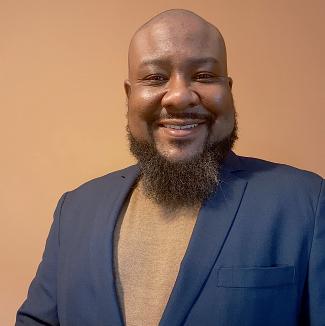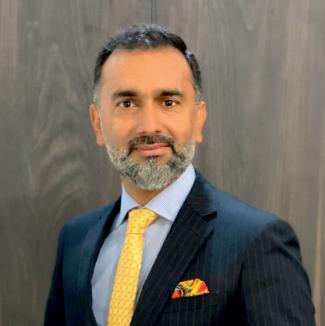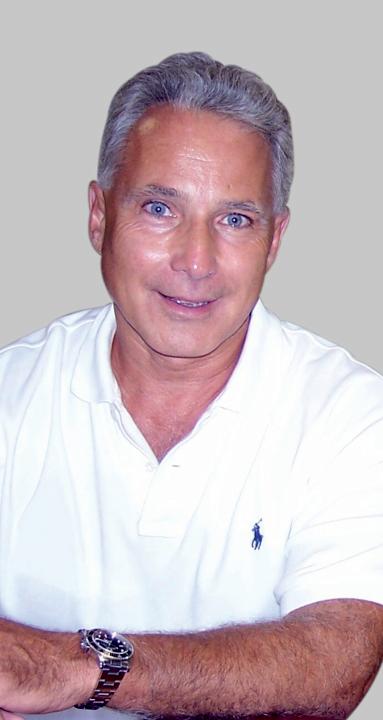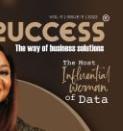












The global financial landscape is undergoing unprecedented transformation, marked by rapid
technologicaladvancement,evolvingclientexpectations,andshiftingregulatoryframeworks.Inthis complexandfast-movingenvironment,strongandforward-thinkingleadershiphasbecomeessential to navigating change and driving sustainable growth.Wealth management, in particular, demands a unique blendofstrategicforesight,innovation,andadeepunderstandingofclients'evolvingneeds.
Insights Success in its recent edition titled The 10 Most Influential Leaders in Wealth Management celebrates visionary professionals who have not only reshaped their organizations but also redefined how wealth is managed, preserved, and transferred in today’s increasingly complex financial landscape. These distinguishedindividualscomefromawiderangeofbackgroundsandfirmtypes,includingglobalfinancial institutions and boutique advisory practices. Their inclusion highlights the fact that influence in wealth management is driven not only by organizational size but also by innovation, thought leadership, and the abilitytobuildlastingclientrelationships.Theirinfluencegoesbeyondachievingbusinesssuccess,reflecting adeepcommitmenttoethicalleadership,technologicaladvancement,andinclusivefinancialgrowth.
As the wealth management industry continues to navigate a landscape shaped by emerging challenges and evolving opportunities, the significance of effective leadership has never been more apparent. In a time marked by persistent market volatility, shifting regulatory demands, and rapid digital transformation, the leadersprofiledhaveconsistentlydemonstratedtheforesightandagilityneededtostayaheadofchange.Their proactive approach to guiding clients through uncertainty underscores their dedication to financial security and long-term prosperity. Collectively, their experiences offer valuable perspectives on resilience, strategic vision,andthefoundationalroleoftrustinshapingthefutureofwealthmanagement.
Haveagreatreadahead!

T h e S t o r i e s W i t h i n




Bishop Brothers
Connec�ng Commerce and Community:Vision for Growth and Social Contribu�on
Eoin Daily
Driving Sustainable Transforma�on in Banking
Eric Smith
Crea�ng a Culture of Excellence in Investment Opera�ons


Suloshini Krishna Singh’s Dreaming Big, Taking Ac�on and Embracing Imperfec�on Guide to Success From Invention to Industry The Future of Scien�fic Innova�on Trends
Market Mastery
Unlocking the Secrets of Financial Minds
Wealth Optimization
Mastering Wealth Strategy for Las�ng Success



AlberthaCharles PartnerPWC
ChadBishop Owner
EricSmith FormerHeadof InvestmentOperations
JinYeeYoung Co-Head
KristinLemkau CEO
MinLanTanHead ChiefInvestment OfficeAPAC
PaulBosley ManagingMember
SibtainBukhari HeadofWealth Management
PWC pwc.com
InXpressCalgary inxpress.com
CascadeAsset ManagementCompany cascadeassetmanagement.com
AlberthaisaPartneratPWC,providingexpertconsulting, managingclientportfolios,leadingauditandadvisoryservices, andcontributingtobusinessdevelopmentwithinthefirm.
ChadistheOwnerofInXpressCalgary,overseeingdaily operations,drivinggrowth,andleadingstrategiceffortsto improvelogisticsandcourierservicesinCalgary
EricistheFormerHeadofInvestmentOperationsatCascade AssetManagementCompany,managinginvestmentprocesses, optimizingoperationsandensuringefficientexecutionof investmentstrategies.
UBS ubs.com
JPMorgan jpmorgan.com
UBS ubs.com
BusinessFinanceDepot businessfinancedepot.com
JinisaCo-HeadatUBS,jointlyoverseeinginvestment strategies,managingteams,drivingbusinessdevelopment,and ensuringoptimalclientservicedeliveryacrossmarkets.
KristinistheCEOofJPMorgan,whereheisresponsiblefor leadingcorporatestrategy,managingexecutiveteams,and overseeingglobaloperationstoensurefinancialperformance.
MinisHeadoftheChiefInvestmentOfficeAPACatUBS, overseeingregionalinvestmentstrategies,riskmanagement, clientadvisory,andgrowthinitiativesacrossfinancialmarkets.
PaulistheManagingMemberatBusinessFinanceDepot, leadingoperations,overseeingfinancialservices,managing clientrelationships,anddrivingbusinessgrowth.
DamanInvestments daman.ae
SibtainistheHeadofWealthManagementatDaman Investments,overseeingclientportfolios,drivinginvestment strategies,andensuringpersonalizedfinancialgrowth.
SuloshiniKrishnaSingh CFO
OptimiGroup optimi.co.za
SuloshiniisCFOatOptimiGroup,overseeingfinancial planning,budgeting,riskmanagement,compliance,and steeringthecompany’sfiscalstrategytodrivegrowth.













Redefining Financial Stability Through Environmental and SocialImpact
The banking industry is undergoing a profound
transformationasitembracessustainabilityasacore business imperative. Regulatory pressures, climate risks, and growing stakeholder expectations are reshaping howbanksoperate,finance,andengagewithcommunities.At the heart of this shift is a commitment to aligning financial success with environmental and social responsibility paving the way for a more stable and equitablefuture.
EoinDaly,HeadofSustainabilityattheCommercialBank ofDubai(CBD),isaleadingvoiceinthistransformation.His journeyintosustainabilitywassparkedbyadeeplypersonal moment: a question from his then-seven-year-old daughter who asked, “Daddy, what are you doing about climate change?” His honest response—“not enough”—became a defining call to action Around that time, sustainability reporting became mandatory for listed entities in the UAE, creating a timely opportunity for Eoin to lead CBD’s transitiontowardamoresustainablefuture.
BackedbythesupportofCBD’sCEO,Dr.BerndvanLinder, Eoinwasgiventhemandatetointegratesustainabilityintothe bank’sstrategy Dr vanLinderrecognizedtheimportanceof maintaining the bank’s social license to operate and committed to addressing the externalities of banking operations.Withthat,Eoinbeganlayingthegroundworkfor CBD’ssustainabilityjourney
Eoin’s diverse professional background in management consultingandleadingstrategicteamswithinCBDprovideda solid foundation for his sustainability leadership His experience building the Change Management Office, ChannelsandDigitization,andCustomerEngagementteams translated seamlessly into forming a high-performing Sustainabilityteam.
Recognizing that sustainability transformation requires organization-wide engagement, he advocated for a systemic shift: every function within the bank needed to contribute. This led to the creation of an ESG Council, composed of representativesfromvariousdepartments,whichwastasked with driving key ESG initiatives and tracking their performance. This cross-functional approach ensured that sustainability was not siloed but embedded across the organization.
Under Eoin’s leadership, CBD has achieved several significantsustainabilitymilestones.Amongthemostnotable wastheissuanceofitsfirstgreenbondin2023—aninitiative that ring-fenced $500 million for projects aligned with their sustainable finance framework. The Green Bond Report released in June 2024 revealed that the projects funded avoidedover100,000tCO2einemissions—theequivalentof what7milliontreeswouldsequesterinayear.
The bank also established its first greenhouse gas (GHG) emissions baseline across scopes 1, 2, and 3, with the assistance of external experts While the majority of emissionsstemfromfinancedactivities,CBDrecognizedthe need to lead by example. They publicly committed to achieving carbon neutrality for their operations by 2030—demonstrating their intent to “get their own house in order”beforeexpectingcustomerstofollowsuit.
Other notable initiatives included revising the bank’s risk managementframeworktoaccountforclimate-relatedrisks, co-hosting the inaugural Future Sustainability Forum, and launchingtheirfirstsustainabilityhackathon.Theseprojects reflectCBD’sbroadercommitmenttoinnovation,education, andcommunitycollaborationinthesustainabilityspace.
Eoinandhisteamconductannualmaterialityassessmentsto identifythemostimpactfulESGpriorities,consultingawide rangeofstakeholdersincludingcustomers,NGOs,and

“Take the first step. Don’t wait to know everything. You’ll learn as you go, and you’ll be surprised by how much support you’ll find along the way.”



government entities. This ensures that the bank remains focused on the initiatives that matter most while adapting to theevolvingsustainabilitylandscape.
CBD’s sustainability approach is also client-centric. For corporate customers, they provide transition finance solutions loans tied to sustainability-linked KPIs that support the shift toward greener business models. For retail customers,greenbankingproductshelppromoteeco-friendly financial choices. These efforts reflect CBD’s ethos of “backing customers’ ambitions” many of which are increasinglyalignedwithenvironmentalgoals.
When it comes to building a career in sustainability, Eoin emphasizes three critical qualities: passion, patience, and perseverance. Passion is essential because sustainability is purpose-driven work; it requires belief in the mission Patience is necessary because not everyone will be on the same page initially people come to their “climate awakening” at different times. Perseverance is key because the work is often long-term and challenging, requiring resilienceandconsistency.
“You don’t need to be Greta Thunberg or Al Gore, but you do need to believe in the cause and recognize there is no ‘Planet B’.”Eoinexplains,
Historically, sustainability was seen as a cost—either for compliance or for marketing. But this perception is shifting. Increasingly,banksandbusinessesarerecognizingthatESGoriented practices lead to stronger, more stable financial performance. For banks, managing climate risk is not just a moralobligationbutafinancialnecessity Ignoringtheserisks couldleadtosignificantlossesdowntheline.
Eoin stresses the importance of partnerships and collaboration. CBD has actively sought to “stand on the shoulders of giants,” learning from global leaders, forming local alliances with other banks, and co-developing sustainablefinanceframeworks.Thiscollaborativespirithas helped accelerate progress and ensure best practices are sharedacrosstheindustry
Eoinbelievestheultimategoalisforsustainabilitytobecome fully embedded in an organization’s strategy and culture.


Eventually,itshouldbesodeeplyintegratedthatitbecomes “second nature”—not just a separate function but part of everydecision,process,andvaluesystemwithinthebank.
Hisadvicetoaspiringsustainabilityprofessionals?“Take the first step. Don’t wait to know everything. You’ll learn as you go, and you’ll be surprised by how much support you’ll find alongtheway.”
Throughvision,leadership,andanunwaveringcommitment to purpose, Eoin Daly is proving that sustainability and financial performance are not mutually exclusive. At the Commercial Bank of Dubai, he’s helping redefine what it meanstobearesponsiblebankinthe21stcentury—onethat doesn’tjustmanagemoney,butalsoshapesabetterfuture.


Philanthropy Through Finance | Former Head of Investment Operations,CascadeAssetManagementCompany
In today's ever-evolving financial landscape, investment
management is far more than a numbers game it’s a discipline rooted in strategy, innovation, integrity, and, increasingly, purpose Leaders like Eric Smith have reshaped what operational excellence looks like in investment management,guidingteamswithauthenticity,vision,andan unwaveringcommitmenttobothpeopleandperformance.As the former Head of Investment Operations and Co-Chair of the Operations Committee at Cascade Asset Management Company,EricSmithhasnotonlybuiltacareerondelivering results but has also created a legacy defined by trust, collaboration,andmeaningfulimpact.
Eric's career reached an important milestone when he joined CascadeAssetManagement,aninvestmentfirmknownforits precisionanditspivotalroleinmanagingtheassetsoftheBill and Melinda Gates Foundation Trust When the opportunity was first presented to him, the idea of building a data management function again was immediately attractive—it wassomethinghehaddonesuccessfullybefore.Butbeyond the professional draw, there was a deeper resonance: the opportunity to support one of the most impactful philanthropiceffortsintheworld.
HavinggrownupduringanerawhenBillGateswasadefining figure in global wealth and technology, there was a cultural weighttojoininganorganizationtiedsocloselytohislegacy More than just prestige, it was the ability to contribute to a global mission that sealed Eric’s decision. Knowing that the behind-the-scenesoperationalworkhewouldleadcouldhelp fuellife-changingprogramsaroundtheworldmadeita“nobrainer.”
OneofthemostdefiningtraitsofEric’sleadershipishisdeep commitmenttobuildingtrustwithinteams.Herecallsreading The Five Dysfunctions of a Team by Patrick Lencioni, a book thathadaprofoundimpactonhisleadershipapproach Thefirst dysfunction absence of trust—particularly struck him. He had worked in environments where communication faltered andpsychologicalsafetywaslacking.Fromthatpointon,he committedtofosteringgenuinetrustandcollaboration.
Hisleadershipstyleisbuiltonthebeliefthathigh-performing teams are rooted in authenticity and openness He frequently quotesSteveJobs’sphilosophy:“Wehiresmartpeoplesothey can tell us what to do” For Eric, empowering others isn’t optional it’s a requirement He believes that without trust, eventhemosttalentedteamswillfallshortoftheirpotential.
ThoughErichasalwaysbeendrivenbyhighstandards,he’salso realistic He begins with an honest acknowledgment: he can’t do everything at the highest level all the time That humility enableshimtorelyonhisteamandtoextendhisimpactthrough others.AtCascade,hisalignmentwiththebroadermissionof the Foundation Trust was essential, even if his role didn’t involvechoosingwherephilanthropicfundsweredirected.
He’s clear about the distinction: the Foundation Trust doesn't decide which programs are funded that’s the role of the Foundation itself His job was to ensure that the capital was available when needed so those decisions could be acted on Andthat,tohim,wasmorethanenough.Ericdeeplyrespected thegenerosityandglobalfocusoftheFoundation’seffortsand found satisfaction in enabling their success through operationalprecision.


Eric’scorevalues curiosity,integrity,authenticity,emotional intelligence,andempathy arecentraltohisleadershipstyle Ofthese,authenticityhasbeenthemosttransformativeforhim Inhisearlycareer,beingasame-gender-lovingindividualwas somethinghekeptprivate.Butashematuredandgrewmore confident, he realized that showing up fully as himself was essential not just for personal peace but for professional effectiveness.
Hisruleissimple:“IgowhereI’mcelebrated,notwhereI’m tolerated”Thatguidingprinciplehasempoweredhimtoseek out environments where he can lead with honesty and conviction ensuring that both the professional Eric and the personalEricremainalignedandpresent.
IntellectualcuriosityalsodrivesmuchofEric’sapproach.He’s someone who prefers to ask questions rather than issue directives This curiosity is not just about acquiring knowledge it’s about unlocking better solutions through inclusive dialogue and shared problem-solving His integrity remains non-negotiable. Across 25 years in finance, he has nevercompromisedhisvaluesandneverwill.
“
Ericthrivesonchallenge Manyoftheroleshe’sheldinvolved building or transforming teams, which requires resilience, flexibility, and a strong appetite for continuous improvement To stay sharp, he studies leadership intentionally reading books,attendingclasses,listeningtopodcasts,andengagingin deepself-reflection.
One of his rituals includes celebrating the wins, both big and small At work, he implemented a "kudos" section in team meetingstospotlightexcellenceamongcolleagues Heknows that recognition builds morale and fosters a sense of shared purpose. On a personal level, he carries that same mindset making space to acknowledge progress and appreciatethejourney.
He also believes in listening truly listening Eric isn’t someonewholistensmerelytorespond Helistenstolearn,to understand, and to shape better outcomes His measured and empathetic listening style has been key in building consensus andguidingthoughtfuldecisions.


“ “
Throughout his career, several mentors and organizations helpedshapeEricintotheleaderheistoday.Oneofthemost formative figures was Janet Gray, a long-time mentor who consistently modeled excellence and provided challenging growthopportunities ShesawpotentialinEricandnurturedit.
At Guggenheim Partners, where he worked during the global financial crisis, Eric saw firsthand what it meant to remain composed and effective amid chaos. Leaders like Gabe Kochmer and Roy Corr left a lasting impression on him teachinghimthatleadershipisn’tjustaboutstrategy;it’s aboutsteadinessinthestorm.
LateratDoubleLineGroupLP,hewasinspiredbyaculturethat truly lived its values A memorable quote from Jeffrey Gundlach,“Wehaveaculturewherewedon’tcompeteagainst ourselves,”resonateddeeply.Hismanageratthetime,Patrick Townzen,reinforcedEric’sbeliefthatleadershiprelationships matter. Eric didn’t leave because of dissatisfaction—he left becauseCascadewasacalling.
OneofthemostdefiningmomentsinEric’stenureatCascade was in 2022, when Bill Gates donated $20 billion to the
Foundation Trust a historic gift that required flawless execution.Ericledthecoordinationeffortsthatenabledthefirm to handle this transaction with a rounding-error level of precision.Hesteppedforwardduringcriticalconversationsto advocate for a strategic course of action, ensuring that execution aligned with the firm’s mission and operational readiness.
His approach rooted in clarity, communication, and coordination demonstrated his leadership style in action. It wasareminderofhowsmalldecisions,madewithintegrityand insight,cansupportglobalimpactonamonumentalscale
ErichassincetransitionedoutofCascade,butheleavesbehind acultureofexcellencethatwillcontinuetothriveinhisabsence. Theteamshebuiltremaindedicatedtodeliveringresultswith integrity,andthefoundationhehelpedstrengthenwillsupport mission-drivenphilanthropyforyearstocome.
Looking ahead, Eric is excited about new possibilities With nearly25yearsofexperience,heiswell-positionedforhisnext chapter.Whereverhegoes,hebringswithhimalegacyoftrust, operational rigor, and a deep belief in the power of finance to createpositivechange.
Inthedynamicandoftenunpredictableworldoffinance,
understanding the cognitive frameworks and strategic approaches of successful financial minds has become a subject of increasing importance.Whether these individuals areinvestors,analysts,portfoliomanagers,orstrategists,their ability to navigate complex markets, assess risk, and seize opportunities sets them apart. Unlocking the secrets behind their success requires examining not only their technical expertise but also the psychological traits and decisionmakingprocessesthatenablethemtoconsistentlyperformat ahighlevel.Financialmasterygoesfarbeyondasolidgrasp of numbers and formulas. It is a sophisticated interplay of analyticalrigor,emotionaldiscipline,andstrategicforesight. By exploring the underlying characteristics that define these financialexperts,wecangainvaluableinsightsintohowthey interpret data, manage uncertainty, and ultimately generate sustained success. This article explores the foundational elements of financial expertise, focusing on analytical methods,psychologicalstrengths,andtheroleofintuitionin strategicdecision-making.
Attheheartofeveryaccomplishedfinancialprofessionallies a robust analytical framework. These individuals possess a deep understanding of quantitative techniques, economic principles, and market mechanisms that allows them to interpretvastamountsofinformationquicklyandaccurately Their analytical skills enable them to dissect financial statements, evaluate market trends, and assess macroeconomicconditions,providingacomprehensiveview ofpotentialrisksandopportunities.
Successful financial minds approach analysis with both precision and creativity While they rely heavily on quantitative data, they also understand the limitations of purelynumericalmodels.Theycombinetraditionalfinancial metricswithmoreinnovativeapproachessuchasbehavioral finance indicators and big data analytics. This multidimensionalanalysishelpsthemdetectsubtlesignalsin


themarketthatothersmightoverlook.Furthermore,theyuse scenarioanalysisandstresstestingtoevaluatehowdifferent economic conditions might impact their investments or recommendations. By simulating various outcomes, they prepare for uncertainty and reduce the likelihood of being blindsidedbyunexpectedevents.
The technical capabilities of financial experts are undoubtedlycrucial,butitistheirpsychologicalmakeupthat oftendeterminestheirultimatesuccessorfailure.Discipline, patience, and emotional resilience are among the most importanttraitsthatallowfinancialmindstoremainobjective and focused, especially during periods of market volatility These professionals know that emotional impulses such as fear and greed can cloud judgment and lead to costly mistakes. Effective financial decision-makers cultivate a strong sense of self-control, enabling them to stick to their strategiesevenwhenmarketconditionsbecometurbulentor whenfacedwithpeerpressure.
Patienceplaysakeyroleinwaitingfortherightopportunities rather than chasing short-term gains This disciplined approachminimizestheriskofimpulsivetradesorreactions tomarketnoise,whichoftenerodereturnsovertime.Another criticalpsychologicalattributeisagrowthmindset.Financial experts view setbacks and losses not as defeats but as opportunities for learning and improvement. This mindset encourages them to continually update their knowledge, reflect on past decisions, and adapt to new information.The financial markets are marked by constant innovation and disruption,andtheabilitytoremainintellectuallycuriousand open-mindedisessentialforlong-termrelevanceandsuccess. Cognitive flexibility complements the growth mindset by allowing financial professionals to revise their beliefs and strategiesinlightofnewevidence.
While analytical skills and psychological strength provide a solid foundation, strategic vision and intuition elevate financial minds to an elite level. Exceptional financial professionals possess the ability to see beyond immediate data and market noise to identify long-term trends and structuralchanges.Theythinkstrategicallyabouthowglobal economicshifts,technologicaladvancements,andregulatory transformationswillreshapeindustriesandassetclasses.This strategic foresight enables them to position their portfolios and recommendations to capture value ahead of the broader market.
Insteadofreactingtoeventsaftertheyunfold,theyanticipate changes and act preemptively. This forward-thinking approachrequiresnotonlyknowledgebutalsoawillingness totakecalculatedrisksbasedonawell-informedvisionofthe future. Intuition, often misunderstood as a purely instinctual process,isinrealitytheproductofextensiveexperienceand deep pattern recognition. Over years of exposure to market cycles,financialprofessionalsdevelopaninternaldatabaseof scenariosandoutcomesthatinformstheirgutfeelings.When faced with incomplete or ambiguous information a common situation in finance — their intuition guides them towarddecisionsthatbalanceriskandrewardeffectively.
By studying these elements, aspiring professionals can develop a more nuanced and effective approach to financial decision-making. Success in finance demands ongoing learning, self-awareness, and adaptability, but by embracing the principles behind these top performers, individuals can significantly improve their ability to navigate uncertainty, manage risk, and identify opportunities in an increasingly complexfinanciallandscape.Inthefinalanalysis,thejourney tofinancialmasteryisnotsimplyaboutmasteringformulasor strategies—itisaboutcultivatingamindsetandskillsetthat harmonize logic, emotion, and foresight. Unlocking these secrets offers the potential to transform the way we understand and engage with the financial world, ultimately leadingtomoreinformeddecisionsandgreatersuccess.


Inthefast-changingworldoffinancetoday,withitscalls for resilience, vision, and integrity, leadership is no longer just about deliverables—it's about propelling purpose-led change.And within the Gulf's finance industry, one pioneer is always remembered as a leadership icon: SibtainBukhari,HeadofWealthManagementatDaman Investments With a professional brand founded on vision, value-basedleadership,andclient-centeredservice,Bukhari isnotmerelycreatingportfolios—he'screatinganewwealth managementmodel.
Bukhariiswellknownforhiscalmandthoughtfulapproach and his capacity to guide clients and teams through the intricacies of contemporary finance He combines the analytical requirements of the profession with a formidable empathy,andthishasgainedhimtheconfidenceofhigh-networthindividualsandsectorplayers.
"My leadership philosophy is grounded in integrity, clientcentricthinking,andclarityofpurpose,"hestates.
ForBukhari,wealthmanagementisnotaproduct—itismore likeavalues-basedjourneyofsharedvisionandlegacyinthe long term. His leadership style is externally oriented and team-oriented, employing teams to think innovatively yet keeping the customer outcomes at the forefront of their agendas.
BukhariwasborninFebruary1979inKarachi,Pakistan.He was a curious and well-disciplined boy from his childhood. Hiseducationaljourneyhadasolidbaseforaninternational career. He completed his bachelor's in business administration from the University of Manchester and his master’s of business administration from the Institute of Business Management, which provided him with good analysisandstrategyskillsatthestartofhisprofession.
Not content to rest on his laurels, Bukhari subsequently pursuedexecutiveeducationatHarvardBusinessSchooland achievedtheLevelVCharteredWealthManagerqualification with the Chartered Institute for Securities and Investment (CISI) in the UK. These achievements further honed his technicalskillsandalsodevelopedhisglobalfinanceoutlook aswellasethicalinvestmentpractices.
Bukhari commenced his career in 2006 with leading international financial institutions including UBL, HSBC, ABNAMRO,andRBS.Thesepositionsgavehimanoverall perspective of retail banking as well as corporate banking activities. He gained hands-on experience in credit analysis, risk management, and client management, building a threedimensionalandversatilesetofskills.
Concurrently,Bukharialsostartedcultivatinganappreciation fortheculturalsensitivitiesrequiredtoengagewithadiverse clientbase—somethingthatwouldeventuallyprovetobeone of his greatest assets when he moved into wealth management.
Bukhari’s natural transition into specialized wealth management roles came during his time at Abu Dhabi Commercial Bank (ADCB), where he focused on portfolio constructionandinvestmentadvisory Heworkedwithawide range of clients, tailoring solutions that addressed liquidity needs,riskappetites,andlong-termobjectives.
Subsequently, at Emirates Islamic Bank, Bukhari assumed leadership roles in the Priority Banking business. There, he advised high-net-worth individuals on strategies for preserving wealth, philanthropic investment choices, and succession planning That experience alone honed his expertise in the principles of Islamic banking—a discipline wherehebecamearespectedthoughtleader

AtDubaiIslamicBankandNoorBank,Bukharicontinuedto ascendtoleadershippositions,managingcomplexportfolios and Shariah-compliant investment recommendations He emphasized long-term planning as compared to short-term speculation,ethicaladvice,andhonestcommunication.
Currently as Head of Wealth Management at Daman Investments, Bukhari heads a team that embodies his philosophy client-focused, ethics-driven, technologyenabled, and grit-based. Bukhari has played a key role in streamliningthestrategyofDamantowardintegratedwealth advisory through the adoption of new age financial technologieswhileretainingthehumantouchatthecore.
He strongly emphasizes ongoing learning and awareness of themarket.Hisstaffgoesthroughfacilitatedweeklymeetings on regulatory updates, market trends, geopolitical risks, and emerging technologies like AI in finance. They are not just enhancingknowledgebutcreatingcuriosityaswellasshared ownership.
His leadership also champions agility. Whether adapting to volatile global markets or regulatory changes in the GCC, Bukhari’sapproachisoneofproactiveadaptationandsmart riskcalibration.
At the heart of Bukhari’s approach is an unwavering commitment to clients’ needs. He believes that wealth management should be deeply personal and that each client relationshipisalong-termpartnership.
He and his staff do more than perform yearly portfolio reviews.Theyhavethetimetofindoutwhatmattersmostto each client—what kind of legacy he wants to leave, what concerns him about risk most, and how his financial objectives change with life milestones. This client-intimacy approach has been key to Daman Investments' long-term successwithhigh-net-worthindividualsandbusinessowners intheregion.
Bukhari believes that risk management is not uncertainty elimination but uncertainty alignment with purpose. His approach is a disciplined mix of quantitative modeling, scenarioanalysis,stresstesting,andgeographicandsectoral diversification. This traps downside risk without being so rigidastomissupsideopportunity

Bukhari’sinfluenceextendsfarbeyondtheclientsheserves. As a mentor, he actively nurtures young financial professionals.AtDaman,hehasinstitutedprogramssuchas “Innovation Huddles”,cross-functionalprojects,andinternal workshops that focus on both technical excellence and leadershipdevelopment.
Heisalsoactivelyinvolvedinthegeneraldevelopmentofthe industry Regular contributor to investment and finance conferences,Bukharisharesviewsonwealthpreservationin uncertain market situations, sustainable finance expansion, and the promise of digital models for advice. An asset financing,pricingstrategy,taxplanning,andIslamicfinance expert,Bukhariisawell-roundedandwell-knownindividual inMiddleEasternfinance.
While Bukhari’s corporate success is well known, his philanthropic initiatives are equally impactful. He views givingbackasaresponsibility,notanoption.
He has played a pivotal role in funding and maintaining mosques, Islamic schools, and community learning centers,
particularlyinunderprivilegedregions.Astrongadvocatefor education, he focuses especially on girls’ education, sponsoringtuition,infrastructure,andlearningmaterials.
In the health care domain, Bukhari regularly sponsors free medicalcamps,eyecareschemes,andAIDS/HIVcampaigns. His teams organize yearly distributions of food packets during Ramadan and other lean months to hundreds of rural andurbanfamilies.
Hehasalsoplayedakeyroleininstallingsolarwaterpumps and clean water filtration systems in water-deficient areas, such as colleges and schools. Due to environmental issues, Bukhari advocates tree plantation drives every year, and throughhisefforts,morethan200,000treeshavebeenplanted inPakistan.
At times of crises floods, earthquakes, or regional conflicts—reliefeffortsareorganizedbyhim.Hischarityalso goes beyond religious lines. Through bridge construction funds and churches for inter-faith villages, Bukhari has a dreamofcommunalharmonyandsocialunity
"Successisnotjustaboutnumbers.It'sabouttheimpactyou leavebehind—andthelivesyoutouch,"statesBukhari.
TheRoadAhead:RedefiningtheFutureofWealth
Inthefuture,Bukhariseesthewealthmanagementindustryas more personalized, transparent, and technology driven. He predicts that the next paradigm shift would be driven by intergenerational wealth transfer and increasing financial sophisticationoftheyoungergenerationofinvestors.
Technology, as far as he is concerned, will also improve the client experience—but it has to be developed to benefit advisors, not override them. His team at Daman is already

testing AI-powered advisory frameworks, ESG-enabling portfolios,andnext-generationfamilyofficeplatforms.
TheobjectiveforBukhariistocreateanorganizationthatstill respondsnimbly,value-driven,andcapableofguidingclients throughturbulencewithhonestyandempathy
Bukhari’scareerisacompellingexampleofwhatleadership in finance should look like principled, inclusive, and visionary His journey from the banking halls of Karachi to leading one of the region’s most respected wealth managementfirmsreflectsnotonlytechnicalexcellencebuta lifelongcommitmenttopeopleandprogress.
“Wealth management is not just about investments-it’s about understanding people’s lives, goals, and legacies.”
Whetherit'screatingcustomizedfinancialplans,inspiringhis colleagues, or defining communities by philanthropy, Bukhari keeps making a difference—decision by decision, relationshipbyrelationship,andinitiativebyinitiative.
Inanindustrythatsofrequentlyisallaboutreturns,Bukhari remindsusthatwealthisactuallydefinedbythevaluethatwe bringtoothers.


In today’s fast-paced business world, strong financial
leadershipisessentialacrossindustries fromautomotive to advertising Few embody this leadership better than SuloshiniKrishnaSingh,CFOofOptimiGroup.With17years ofexperienceacrossawidespectrumofsectorsandarobust track record in strategic financial management, Suloshini’s impact reaches far beyond spreadsheets. She is a visionary who believes in purpose-driven leadership, continuous improvement,andthepowerofpeopletodriveorganizational success.
At 16, Suloshini stood at a familiar teenage crossroads: uncertainaboutherfuturecareer.WithnoGoogleorAItoguide her,careerinsightscamefromencyclopedias,word-of-mouth, andlimitedexposuretoprofessionalroles.Althoughshehada love for Math and Physics, it was an unexpected source—a friend of her sister, newly qualified as a CA(SA)—who introducedhertoaccounting.
HiscanaryyellowBMWM3might’vecaughthereyefirst,but it was the promise of challenge, prestige, and opportunity in financethatsealedherdecision “It’sfunnyhowlifeworksout,” shereflects.Today,whiletheM3remainsadream,herGolfR androleasa“soccermum”areremindersofhowaspirations evolvewithtimeandpurpose.
AsCFOatOptimiGroup,Suloshini’smissiongoesfarbeyond managingfinancialstatements “It’saboutsupportingtheCEO and helping the business grow,” she explains Her leadership focuses on unlocking value through innovation and efficiency—notjusttickingcomplianceboxes.

She sees the role of finance as integral to business strategy, requiring not only technical proficiency but also a strong foundation in soft skills “Soft skills like influencing, empathy, and communication—are essential. They’re what createacultureofinnovationandengagement.”
Suloshinimakesitapointtoinjectfunintofinancetoo.“Yes,it ispossible,”shesmiles,advocatingforanenvironmentwhere professionalsarenotonlyskilledbutalsomotivatedandexcited abouttheirwork.
For Suloshini, effective strategy starts with understanding the broaderbusinessgoals.“Financecan’toperateinisolation.We can’tbethebeancountersinadarkroom Ourstrategiesmustbe aligned with the organization’s objectives—both long and shortterm.”
Open,clearcommunicationplaysapivotalroleinenablingthis alignment. While “communication” may sound like a buzzword, she warns that many leaders still don’t get it right. “Somanyissuesstemfrompeoplesimplynottalkingtoeach other,” she says. For her, keeping channels open ensures agilityandtheabilitytopivotquicklywhenconditionsshift.
Suloshini’s diverse sector experience didn’t happen by accident.Shedeliberatelysoughtoutdifferentindustriestogain deeperinsightintohowbusinessesoperate.Hermethod?Listen first. “Before implementing any change, I listen—to the business, to the people. It can take up to four months just to understandthecultureandchallenges.”
Only after building this understanding does she begin to implementchanges andeventhen,cautiously. “You haveto introducechangeinsmall,manageablesteps,”shenotes This empathetic, measured approach helps organizations adapt withoutresistanceoroverwhelm.
Inleadingteamsofvarioussizes,Suloshinihasencountereda consistentchallenge:differinginterpretationsofaccountability andtransparency Toaddressthis,sheemployswhatshecallsa ‘dipstick test’—an informal assessment of where her team membersstandonengagementandalignment.
But instead of leaning heavily on formal team-building exercises, Suloshini prefers consistent, personal engagement. “A fancy team lunch at a posh restaurant won’t fix disengagement,”shesays.Whatmattersmore?“One-on-one chats,braais,andshowingrealinterestinpeople.”
“Ifirmlybelieveinsurroundingmyselfwithexperts,”Suloshini shares.“Ifyou’rethesmartestpersonintheroom,you’reinthe




wrong room” She draws inspiration from Gordon Ramsay’s collaborativekitchenmodel:eventhebestneedsupport.
Inanever-evolvingbusinesslandscape,Suloshini’sstrategyis tostayinformedbytappingintotheknowledgeofspecialists. “RelyingonsmartpeoplekeepsmesharpandensuresImake sounddecisions.”
InadditiontoherCFOduties,SuloshinileadstheHRteamat Optimi. True to her style, she began with observation and listening. “We needed to understand where the organization stood before developing short-, medium-, and long-term engagementstrategies.”
Shebelievesemployeeengagementisn’taboutperksorevents “It’s about knowing people their needs, aspirations, and challenges.Onlythencanyoubuildacultureofexcellence.”
AccordingtoSuloshini,realsuccessinaCFOrolecomesfrom influence, not just authority “Anyone can know accounting standards or legal requirements,” she says “But a great CFO instillsmeaninginotherstohelpthemperformattheirbest.”
Acknowledging that she can’t do everything alone, Suloshini places great value on teamwork. “You need people. Without them,eventhebeststrategiesfallshort”
Apersonalproponentof Kaizen theJapanesephilosophy of continuous improvement Suloshini believes in learning throughiteration.Shecomparesittobaking:“Ifacakeflops,I don’tgiveup.IbakeitagainandagainuntilIfigureitout.”
This mindset translates into her professional life For her, the truejoyofbeingaCFOliesnotinfinalizingAnnualFinancial Statementsbutinwatchingherteamgrow “It’saboutpeople. Seeingsomeoneflourish—that’stheultimatereward.”
Suloshinienvisionsafinancefunctionthat’sdynamic,engaged, andfullyintegratedintobusinessdecision-making “Wecan’t be the ones hiding in corners with spreadsheets that no one understands,”sheasserts.Instead,financemustevolveintoa strategic, people-centric unit aligned with the company’s vision.
“I’m optimistic that by focusing on people, we’ll continue to drive this evolution The more aligned we are with where the businesswantstogo,themoreimpactwecanmake”
Astrongbelieverindreamingbig,Suloshiniisequallypractical about the journey. “Dreams are essential but they mean nothing without action” Flexibility is just as important “You canhavethebestplan,butyoualsoneedthematuritytopivot whenlifethrowscurveballs.”
As a wife, mother, daughter, pet owner, and CFO, Suloshini knows the pressures of wearing multiple hats. Her advice? “Don’tbetooharshonyourself.You’reonlyhuman.”
She encourages people to evaluate their progress over longer periods “Don’t measure yourself daily Look at what you’ve accomplishedovertime That’swhererealgrowthandbalance lie”







www.insightssuccessmagazine.com











Wealthisalsoerroneouslybelievedtobeaproduct
of mere high income or chance. The secret to wealthlong-termsuccess,however,liesinawellplannedandwell-implementedwealthstrategy.Thestrategy canbeattainedwithapropergraspoffinanceconcepts,selfcontrolinplanning,andquicknesstochangeaseconomicand personal conditions change In our own brawny and occasionallystormyeconomy,buildinglastingwealthismore aboutbuildingastrongfoundationwiththeabilitytosustain and grow over the long term than about chasing after temporaryprofits.Thewealthypossesssomethingmorethan a collection of possessions. It involves investing and accumulating such assets, managing risk, minimizing tax costs, and strategically planning for passing on wealth between generations. Individuals who master such allied professions are in a position not only to increase their portfolioofwealthbutalsoprotectitfromblindtraps,leading tosustainedsuccess.
This article identifies the most important elements of a wealth plan that can bring long-term financial success and provides down-to-earth advice on how to use these principles to gain long-termcommandoverwealth.
Atthecoreofanysuccessfulwealthplanistheestablishment of a solid financial foundation. The root is established by havingvisionandaclear,definedsenseofwhereonestandsin thecategoriesofassets,liabilities,incomes,expenses,andnet worth. Without clarity, attempts to protect and accumulate wealth become reactive, chaotic, and wasteful. The first is tight budgeting and cash control in order to guide spending habitsintowealth-generatingobjectivesinsuchamannerthat discretionary expenditures would not reverse the process of wealth creation. Together with day-to-day money management,afinewealthplanalsoentailstheformationofa diversified investment portfolio that blends with one's objectives,timeframe,andriskcapacity


Diversification across asset classes—namely, equities, fixed income, property, and alternatives is best at reducing market volatility and generating potential for stable, longterm returns. Additionally, adequate emergency fund with liquidity insulates from surprise expense or loss of income, and caution in debt management on a conservative basis avoids depletion of net worth through interest cost and financial distress.All such foundational pillars build a solid foundationonwhichwealthcangrowwell.
Investingisperhapsthemostsignificantcomponentofwealth creation, but good investing depends on having a good thought-outplanandgoodriskmanagement.Theformulafor growthistomakeinvestmentdecisionswithintheparameters ofone'splanandrisktoleranceandstaydisciplinedunderthe swayofmarketupheaval.Successfulinvestorsknowhowto resistbeingswayedwithspeculativeordoomedtransactions that bring rapid returns. Rather, they embrace a long-term, patientapproachthathaspotentialtoleveragecompounding returnsaction.Riskmanagementismorethandiversifyingan investmentportfolio.
Risk management also encompasses the utilization of safety devices such as insurance coverage to protect against unforeseen loss caused by health, property, or liability. Statutory vehicles such as trusts and limited liability companies provide further asset protection and can be designed to maximize tax results. Tax efficiency for its own sake is also a vital consideration—leveraging retirement accounts,tax-favoredinvestmentvehicles,andsmarttax-loss harvesting can play an important role in net returns. With overallriskmanagement,notonlyisone'smoneysaved,but onepositionsittogrowevenmoreacrossmultipleeconomic cycles.
Wealth strategy study is not finished without intentional planning for the fiscal well-being and legacy of the next generation. Its facet is estate planning, which includes the draftingofwills,trusts,andotherlegaldocumentsintendedto transfer property economically, according to the owner's preferences Effective estate planning eliminates the possibilityoffamilyfeud,minimizesestatetaxes,andleaves assets undiminished and properly passed on, hence guaranteeingfamilytranquilityandfiscalcontinuity
In addition to the mechanics of transferring assets, good legacy planning also involves teaching inheritors about the importanceofbudgetingandtheprinciplesthatdrivewealth management.Teachingvaluesandknowledgemakeswayfor a culture of sustainability as opposed to entitlement and teachesthenextgenerationhowtoaccumulateandmaintain wealth. Philanthropy may also be an additional extension of legacy planning by contributing back to society in areas of concern to them, creating a legacy beyond the family. Implementing this action not only benefits society but tax benefitsaswellasanimprovementofthefamily'simage.
Tobecomeamasterinwealthstrategyforlong-termsuccess, one needs a whole and systematic approach. It begins with establishingasoundfinancialbaseonthefoundationofclear understanding and cautious handling. Wealth is established for growth and protected through wise investment and cautious risk management, and vigilant estate planning ensures the passing on of wealth and values to the next generation When such fragments are used within a comprehensive plan, individuals can convert wealth into a lasting and permanent legacy from a temporary accomplishment that will endure economic downturns and changing personal desires. This shared vision of wealth planning is the solution to long-term financial success and prosperity










